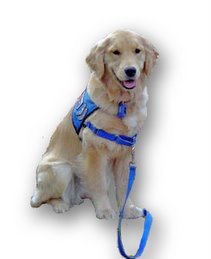 A lot of people (and kids!) seem to know not to pat me when my vest is on but they don't realize that talking to me is also distracting. I need to keep my focus on Suzan, especially when she is using her cane. Can you imagine if I veered off whenever someone said "what a good dog"! I could inadvertently pull Suzan over!
A lot of people (and kids!) seem to know not to pat me when my vest is on but they don't realize that talking to me is also distracting. I need to keep my focus on Suzan, especially when she is using her cane. Can you imagine if I veered off whenever someone said "what a good dog"! I could inadvertently pull Suzan over!The other thing you can help me with is explaining to your pet dogs that I have a job to do and can't socialize when I'm on duty. Since they might have a hard time understanding, you'll have to help us both out and "do not let your dog initiate contact", #4 below. Thanks!
Don't worry, I get LOTS of off duty play time and just hanging out and being a regular dog. I have doggie play dates, go to the beach a lot and go geocaching. And even when I'm "working", it's like a game to me. I do a lot of retrieving for Suzan which I love to do. I even bring her things around the house that she hasn't asked me for because I love doing it.
Don't Touch or Feed Assistance Dog Without Asking Permission
December 29, 2007
Dear Abby: I was having lunch in a restaurant recently. Seated next to us was a family who had an assistance dog for their teenage son. I was appalled when someone from another table approached the dog, began talking baby talk to it (while ignoring the people!) and dropped a scrap of meat on the floor in front of the dog's nose.
The dog ignored the "treat," and the mother calmly asked the person to please stop distracting their assistance dog while it was working. I was dazzled by her politeness in the face of such rudeness and thoughtlessness.
Abby, people need to know how to behave around assistance dogs so they don't endanger the person with a disability or the dog:
(1) Always speak to the person first. Do not make distracting noises to the dog.
(2) Always ask before you pet. Do not touch the service dog without first asking for and receiving permission. Petting should be minimal and cease as soon as the person gives the dog a command.
(3) Never feed or offer food to a working dog. It distracts him and lures him away from his important job as an assistance dog.
(4) Do not let your dog initiate contact with a working dog while it's on duty.
(5) Do not ask personal questions about the person's disability or otherwise intrude on his/her privacy.
The Americans With Disabilities Act (ADA) ensures people with assistance dogs have access to public places and businesses. Please welcome them into your establishment. -- Karyl Carmignani, Canine Companions For Independence
Dear Karyl: It's amazing how many animal lovers do not grasp the fact that when they see an assistance dog out in public that the animal is WORKING. Although wanting to reach out and touch it is natural, it is no more correct than it would be to pet a dog that works in law enforcement. Thank you for your informative letter. I hope readers will learn from it because many of your comments apply to animals in general.







3 comments:
Thank you, Logan. That was very informative.
I was wondering, around the house, do you wear your vest?
Much Love,
Molly
Hi Logan;
Great information, I guess a lot of people mean well they just don't understand that when your working you are helping Suzan and you can't be distracted.
We know first hand how hard it is to want to pet you and love you but we must respect the job you do.
Keep up the good work with Suzan because she is really, really, special to us.
I have a guide dog, and am currently training my second guide/service dog. I've noticed in the 8 yers that I've had my guide dog that kids usually tell the adults they are with that you are not suppose to pet my dog. The adults seem to have no idea!
Post a Comment